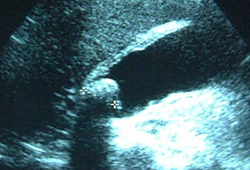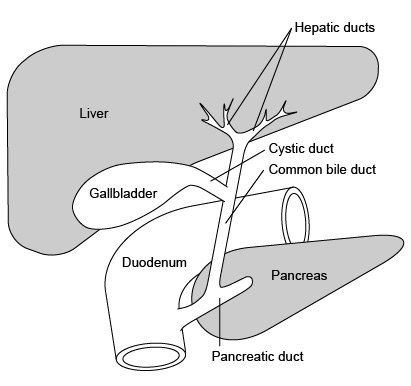Summary
Definition
History and exam
Key diagnostic factors
- previous episode of biliary pain
- right upper quadrant pain
- positive Murphy sign
- abdominal mass
Other diagnostic factors
- right shoulder pain
- anorexia
- nausea
- fever
- vomiting
- jaundice
Risk factors
- gallstones
- physical inactivity
- low fiber intake
- severe illness
- trauma
- severe burns
- total parenteral nutrition (TPN)
- diabetes
- use of ceftriaxone
- use of cyclosporine
- hepatic arterial embolization
- infections
Diagnostic tests
1st tests to order
- CBC
- C-reactive protein
- LFTs
- right upper quadrant ultrasound scan
Tests to consider
- cholescintigraphy (hepatobiliary iminodiacetic acid [HIDA] scan)
- abdominal CT
- abdominal MRI
- abdominal x-ray
Treatment algorithm
mild (grade I): stable without signs of perforation/gangrene
moderate (grade II): stable with signs of perforation/gangrene
severe (grade III): suspected gangrene/perforation or evidence of organ dysfunction
Contributors
Expert advisers
Charles Bellows, MD
Professor of Surgery
University of New Mexico
School of Medicine
Albuquerque
NM
Disclosures
CB is an author of one study referenced in this topic. CB declares that he has no other competing interests.
Peer reviewers
Satyajit Bhattacharya, LVO, MB, MS, MPhil, FRCS
Consultant Surgeon
HPB Surgery Unit
The Royal London Hospital
London
UK
Disclosures
SB declares that he has no competing interests.
Stefano Guandalini, MD
Professor of Pediatrics
Chief
Division of Gastroenterology, Hepatology, and Nutrition
University of Chicago Comer Children's Hospital
Chicago
IL
Disclosures
SG declares that he has no competing interests.
Peer reviewer acknowledgements
BMJ Best Practice topics are updated on a rolling basis in line with developments in evidence and guidance. The peer reviewers listed here have reviewed the content at least once during the history of the topic.
Disclosures
Peer reviewer affiliations and disclosures pertain to the time of the review.
References
Key articles
Yokoe M, Hata J, Takada T, et al. Tokyo Guidelines 2018: diagnostic criteria and severity grading of acute cholecystitis (with videos). J Hepatobiliary Pancreat Sci. 2018 Jan;25(1):41-54.Full text Abstract
Pisano M, Allievi N, Gurusamy K, et al. 2020 World Society of Emergency Surgery updated guidelines for the diagnosis and treatment of acute calculus cholecystitis. World J Emerg Surg. 2020 Nov 5;15(1):61.Full text Abstract
Gomi H, Solomkin JS, Schlossberg D, et al. Tokyo Guidelines 2018: antimicrobial therapy for acute cholangitis and cholecystitis. J Hepatobiliary Pancreat Sci. 2018 Jan;25(1):3-16.Full text Abstract
Mayumi T, Okamoto K, Takada T, et al. Tokyo Guidelines 2018: management bundles for acute cholangitis and cholecystitis. J Hepatobiliary Pancreat Sci. 2018 Jan;25(1):96-100.Full text Abstract
Wakabayashi G, Iwashita Y, Hibi T, et al. Tokyo Guidelines 2018: surgical management of acute cholecystitis: safe steps in laparoscopic cholecystectomy for acute cholecystitis (with videos). J Hepatobiliary Pancreat Sci. 2018 Jan;25(1):73-86.Full text Abstract
Reference articles
A full list of sources referenced in this topic is available to users with access to all of BMJ Best Practice.

Differentials
- Acute cholangitis
- Chronic cholecystitis
- Peptic ulcer disease
More DifferentialsGuidelines
- ACR appropriateness criteria: right upper quadrant pain
- TG18 flowchart for the management of acute cholecystitis
More GuidelinesVideos
Venepuncture and phlebotomy: animated demonstration
Central venous catheter insertion: animated demonstration
More videosPatient information
Gallstones
More Patient informationLog in or subscribe to access all of BMJ Best Practice
Use of this content is subject to our disclaimer
